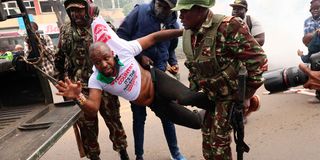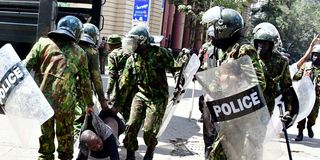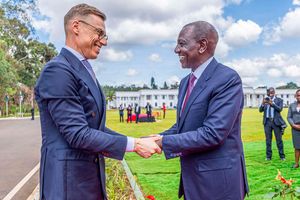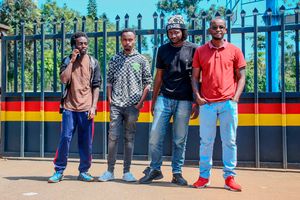
Police officers arresting activist Boniface Mwangi on Kenyatta Avenue in Nairobi during anti-government protest on July 25, 2024.
President William Ruto’s tenure has been marred by a rise in human rights abuses and political intolerance, casting doubt on his commitment to upholding the rule of law and painting him as thin-skinned.
Crackdowns on critics of the government, arbitrary abductions, torture, State-enforced disappearances and extrajudicial killings continue to characterise the regime.
Human rights activists have accused the government of blatant abuse of power, denial of bail and fair legal procedures to individuals arrested. The recent arrest and detention of Ms Rose Njeri is the latest of the Kenya Kwanza administration’s atrocious human rights record.
Ms Njeri’s arrest for creating a tool to help Kenyans give their views on the Finance Bill 2025, came just days after President assured the country that individuals who had been disappeared had been reunited with their families.
“I have issued clear and firm instructions that such incidents will not happen again. When I took office, I committed to ensuring that extrajudicial killings and the disappearance of Kenyans would not be part of my administration,” said the President during a meeting with Finnish President Alexander Stubb.
According to the Kenya National Commission for Human Rights (KNCHR), 82 people have been abducted since June last year, with 29 still missing. In December 2024 alone, the commission recorded 13 missing persons cases.
Following the arrest of Ms Njeri, former Deputy President Rigathi Gachagua accused the government of targeting young people, terming the arrest of the software developer an attempt to crush civic expression. The Democracy for Citizens Party leader, an ally-turned foe of President Ruto, said the country is dangerously sliding towards authoritarianism.
“This government has learnt nothing from the Gen Z protests. Rather than embrace dialogue, it is using fear and intimidation to silence those who speak up,” said Mr Gachagua in a post on social media.
Interestingly, Ms Njeri’s arrest also came shortly after the President apologised to Gen the Z during the National Prayer Breakfast, an apology that was termed insincere.
“To our children, if there has been any misstep, we apologise,” said President Ruto.
During last year’s deadly Gen Z-led protests against runaway taxes and bad governance, police killed at least 60 Kenyans, mostly youth, while others were disappeared and are yet to be found.
This was a far cry from the promise by President Ruto, during the campaigns, to end police abuse, especially against urban youth, as well as ending all forms of extra-judicial killings by security forces.
In the Kenya Kwanza manifesto, the President also pledged to set up a special tribunal for gross human rights violations and enforced disappearances, appoint an Ombudsman to monitor human rights violations as well as ratify and domesticate the International Convention for the Protection of all Persons from Enforced Disappearances.
The promises have remained on paper as Kenyans continue to be met with a brutal police clamping down on critics of the government.

A protestor is carried away by anti-riot police officers during the Anti-Finance Bill demonstrations in Nairobi June 25 2024.
It took until December 2024 for the President to admit there had been instances of excessive and extrajudicial actions by the security services, followed by a promise to end this. The admission followed a new wave of abductions targeting tech-savvy, young, anti-government online activists, including Billy Mwangi, Peter Muteti, Bernard Kavuli and Rooney Kiplangat.
A recent report by Missing Voices painted a grim picture of the state of human rights since President Ruto took office in September 2022. According to the report, 104 extrajudicial killings were recorded in 2024, all of which were linked to the police.
Cases of enforced disappearances, on the other hand, were up five times in 2024 to hit 55, compared to 2023 which recorded 10 cases. Prior to 2024, the year 2019, with 38, had the highest number of enforced disappearances.
Nairobi (38), Kiambu (9) and Migori (6) were the most dangerous counties in matters of extrajudicial killings in 2024. Other counties where the cases of killings were recorded include Kakamega (5), Nakuru (5), Makueni (4) and Uasin Gishu (4).
Law Society of Kenya President Faith Odhiambo said enforced disappearances and extrajudicial killings are not a case of bad apples within the security agencies, but symptoms of failure that requires constitutional fumigation.
“We have to hold police officers culpable of these offences accountable. The bad officers must be rooted out,” she said
Former Chief Justice David Maraga decried the sharp increase in State-sponsored intimidation and suppression. He blasted the government for failing to ratify human rights conventions and frameworks.
From the onset, Kenya Kwanza’s ascent to power has been riddled with little respect for human rights and the rule of law.
The government first came under pressure over police brutality during the opposition’s anti-government protests in 2023. At least nine people were killed in the protests, according to the State-funded KNCHR, while at least 300 people were arrested. However, the United Nations put the figure at 23.
“We are very concerned by the widespread violence and allegations of unnecessary use of force, including the use of firearms, by police during protests in Kenya,” the UN said through the Human Rights Office spokesperson Jeremy Laurence.
But in the wake of anti-tax protests, the situation has become worse.
“We are regressing into the dark abyss of violations and atrocities. We condemn these violations (by the police) in a country that prides itself in its democracy and rule of law,” said KNCHR in a statement.
Reducing the Gen Z protests to treasonous events and threats to national unity, the President claimed that the demonstrations were hijacked by dangerous criminals. The President has since then had a climb-down although he has been sending mixed signals over his government’s possible involvement in the abductions of government critics.
In the aftermath of the protests, President Ruto set aside the Finance Bill, 2024, sacked his Cabinet and promised reforms in the police service.
However, only Inspector-General of Police Japhet Koome resigned. The police and other security agencies have continued violating the rule of law.
President Ruto’s administration has been under sharp criticism over misuse of State agencies to suppress dissent through use of repressive tactics, the same approach he criticised his predecessor of using.
Disappearances and abductions
In April, Kenya’s civil society issued a harsh assessment of the first half of President Ruto’s term, describing his leadership as repressive, chaotic and a threat to democratic progress. The groups said that the current administration has made public space unsafe, with growing incidents of police violence, unlawful arrests and suppression of protest.
Mr Davis Malombe from the Kenya Human Rights Commission said the State has abandoned the rule of law and disappearances, abductions and violent arrests have been normalised.
“We are witnessing a regime that is systematically dismantling democratic governance and civic freedoms,” said Mr Malombe. “We have recorded 228 cases of police torture and 67 extrajudicial killings reported between January and September 2023. Another 63 people died and more than 600 were injured during last year’s youth-led protests.”
Activist Khelef Khalifa added: “Over 60 civil society leaders and human rights defenders have lost their lives over the past two years. The last two years have shown us that authoritarian leadership and corruption are not just a fiscal issue but a human right.”
Defiance of court orders by senior State officials also continues in the current regime. The government has also normalised the use of lethal crowd control weapons by the police despite a court order banning their use.
Last year, Deputy Inspector-General of Police Gilbert Masengeli became the face of such disobedience when he refused to obey a court order requiring him to produce before court three people abducted in Kitengela—Boby Njagi, Aslam Longton and Jamil Longton.
President Ruto has also threatened to disobey court orders, accusing the Judiciary of impunity and being used to sabotage his administration. This was in sharp contrast for a man who in 2020, while serving as the Deputy President, warned that the “slide to anarchy and impunity will begin the day we don’t respect the rule of law and court orders” .
His defiance and attacks against the Judiciary stemmed from a string of court losses resulting in orders halting projects the Kenya Kwanza government intends to implement.
President Ruto’s government has also been accused of weaponising the criminal justice system as it cracks down on political leaders opposed to the regime.
Late last month, former UDA Secretary-General Cleophas Malala accused President Ruto of failing to honour his campaign promise not to weaponise the police or criminal justice system against dissenting voices.
Siaya Governor James Orengo has also been vocal about the issue.
“The police should not be used to make up trumped-up charges. Let us build a society that is based on the Constitution and the rule of law,” said Mr Orengo in April.
In September 2024, Mr Gachagua accused the regime of weaponising the criminal justice system against him and political leaders allied to him.
See some of our other Ruto@1,000 coverage below:








